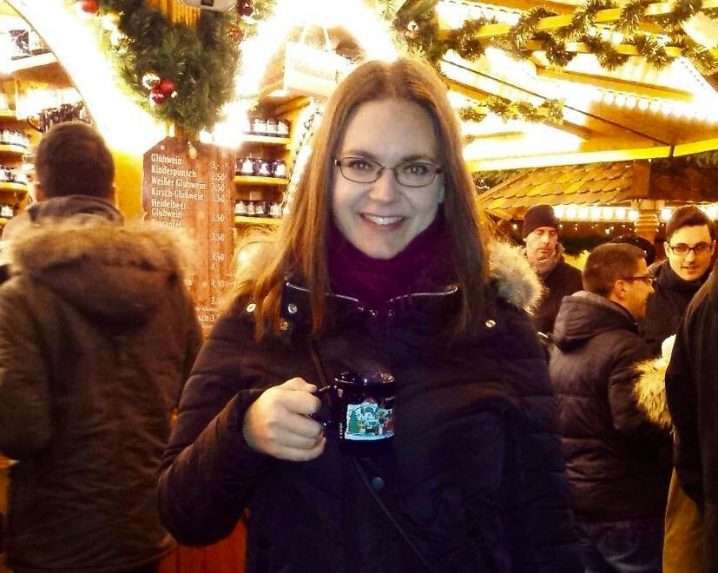Feel like swapping your American pancakes for a full English breakfast? Or travelling to dinner in a gondola instead of your old Volvo? What about a night at the real Moulin Rouge, and leaving the film at home?
There is so much to see in Europe, and there is nothing like immersing yourself in new cultural experiences on the other side of the pond. As an American living in the UK, I have taken advantage of having Europe at my doorstep and have learned many tricks along the way.
Below are my top tips for traveling Europe, especially if you’re traveling here for the first time. These tips will help you to stay safe and organised so you can make the most of your exciting adventure abroad.

Traveling To Europe For The First Time
TRAVELLING DO’S
Carry two wallets, two forms of ID and two credit or debit cards
I have a blue wallet for my regular money and cards, and a red wallet for when I travel. The two wallets allow you to easily move between currencies, and you can leave one at the hotel and carry one with you.
That way, if anything happens when you are out during the day, you still have your backup wallet. Make sure you leave your passport with your wallet at the hotel, and put another valid form of ID in the wallet you carry with you, such as a drivers license or residence permit.
I would also suggest bringing two different bank cards with you and dividing them between the two individual wallets. This will allow you to access money in an emergency, if anything should happen to the wallet you carry with you.
If you follow this tip, make sure to lock up your wallet and passport at the hotel. The last thing you want is to lose all forms of ID and end up penniless in a foreign country.

Frankfurt in Germany
Wear comfortable walking shoes
Expect to be walking in most places, particularly in European cities where walking is the norm. Luckily, there are some trendy options that will help you fit right in with those fashion-forward Europeans.
Ladies, consider a pair of low-heeled black ankle boots or lightweight (but stylish) hiking boots if you’re planning on going off the beaten path. For men, try water-resistant and breathable leather lace-up walking shoes.
Trainers (sneakers, for my American compatriots) will also serve this purpose if you don’t mind being outed as an American tourist. If you a planning a night out, ladies, consider low heels or comfortable flats. Add cushion insoles as needed, and make sure your shoes are already worn in and don’t rub or pinch your feet (trust me on this one!).
Also, be sure that your footwear is weather-appropriate and durable. I will never forget the time I travelled to Berlin in the winter, and my thin leather boots- which were fine for the chilly English drizzle- virtually disintegrated in the frosty German sleet and snow.
I ended up purchasing a hardy pair of faux-fur-lined boots from the Berlin Galeria for €99, and those boots not only saved my toes from the cold but lasted another three winters.

View of famous Grand Canal from Rialto bridge, Venice
Carry a map – several, in fact!
I would suggest carrying paper maps of the city and metro and also downloading the map of your city or town on Google Maps, which will allow you to track your location, help you find directions, and scope out places of interest, all offline.
Personally, I like to write all over my paper maps, circling the location of my hotel and other areas of interest. I find it is also handy to pull out a folded map if I get lost or need to ask a local for directions, so I don’t have to hand a stranger my mobile (cell phone, in American) or iPad.
It is also useful to check the distance between two places, as European cities are usually very walkable, and the best way to discover any city is on foot. Travelling on foot allows you to make spontaneous stops along the way or change your route at the last minute if you so choose. It’s also the cheapest way to travel!
Some maps will actually tell you the walking distance between two stops, such as the walking tube map in London, but in most cases, you will need to look this up or ask a local.
Learn basic words in the local language
A great way to get by in a foreign country is to try to communicate with the locals. Even using the most basic of words and phrases, such as hello, goodbye, please and thank you, will make you come across as friendly and polite- someone worth engaging with!
I’ve found that ‘pardon me’ is also a useful phrase, both to mean ‘excuse me’ when you need to get someone’s attention and ‘sorry’ for when you inevitably bump into people in the busy metro or on crowded city streets (try saying this in German: Entschuldigung!).
Even if your pronunciation is all wrong, your effort will not go unnoticed by the locals, and you will also feel très chic.

Barcelona in Spain
Stay healthy by taking care of your body
This means making healthy food choices, staying hydrated, and getting enough sleep. When you are travelling for any period of time, you lack a daily routine, and it is easy to neglect basic self-care.
You might want to try all the local cuisine, and while this is an exciting and important cultural experience, this sudden change in your diet can lead to tummy aches, digestion issues, headaches, and lethargy.
I would suggest trying to incorporate as much fruit and veg into your diet as possible and limiting cookies, cakes, and sweets to an occasional treat. Stick with water as your main, if not only, source of hydration.
I tend to buy the big 2 litre bottles (about €1) and carry them around with me for the day. If you have a refillable water bottle, that is even better, but be sure to check that you are in a place where the local tap water is safe to drink.
Sleep is also a very important part of staying healthy whilst travelling. Going out every night will run you ragged, and you will feel exhausted during the day. Lack of sleep will also lower your immune system, and you can become more susceptible to viruses and colds going around. Aim for around 8 hours of sleep a night, minimum.
Lastly, be sure to stay on top of any prescription medicine you need to take, as well as any vitamins you take on a regular basis. Your body will thank you for it, and you will feel fit and well, and strong enough to tackle another day of adventure in Europe.
Bring a spare charger and charge it fully before you set out for the day
There is nothing worse than all of your devices dying on you at the end of the day when you want to take a photo of that beautiful sunset in Prague or an incredible view of Paris from the Eiffel Tower at night. Charge that phone! This is also important for emergency situations – you need to be able to call for help if you end up in a sticky situation.

Brandenburg Gate in Berlin
Bring layers of clothing for all types of weather
Not only will you be prepared to bundle up for when it gets cold in the evenings, but this trick also allows for more style variety in your travel wardrobe. Mix and match t-shirts, long-sleeve tops, jumpers, and jackets.
You can then peel them off when you’re lounging on a sunny beach in Barcelona or layer up as the sun goes down as you’re walking along the Prinsengracht canal in Amsterdam on a chilly evening.
You’re likely to be doing a lot of walking outdoors when travelling in Europe, and the temperature can drop quite rapidly at night, especially in the winter season. Don’t forget your scarves, hats, gloves, and thermals when you do your packing list.

Charles Bridge in Prague
TRAVELLING DON’TS
Carry your passport around
People who do this tend to use their passport as their primary ID, and it’s an easy way to lose your most important travel document. I much prefer to keep my passport locked up and only take it out when I need it. It is also a good idea to have copies of your passport kept in different locations. You might consider carrying a copy around instead, which is much easier to replace.
Eat out at every meal
Eating out can be fun, but eating out every day is unhealthy and very costly. Save money by finding a local market and buying fresh produce to cook with, or nab a budget-friendly sandwich on the go. You will feel better when you avoid all of the salt, sugar, and extra calories that go into restaurant food, and the money you save can be used for more fun activities.

Copenhagen in Denmark
Draw attention to yourself unnecessarily
Be street smart, keep your head down, and walk with quiet confidence. You make yourself a target when it becomes clear that you are a tourist. Go with the flow, and you will keep out of trouble and stay safe.
Drink to excess
You need to keep your wits about you when you are in unfamiliar surroundings, and you make yourself vulnerable to pickpockets -or worse- when you are drunk.
What are your best travel tips for staying safe and having fun in Europe? Let me know in the comments below. Find out how to travel solo in Europe with our solo destination guides
This article was originally published on Soapbox. Sara has kindly let us use her tips for Girl about the Globe.

More reading on Europe
- Solo Travel in Europe
- Best Hostels in Europe For Solo Travellers
- Best European Cities For Solo Travel
- Best Places For European Winter Sun
- Travel Planning Websites


